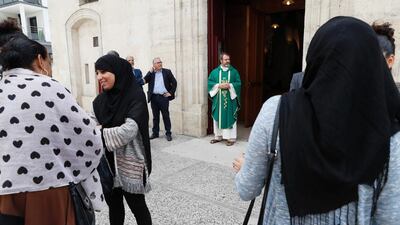In poignant television images, Muslims are seen shoulder to shoulder with Christians inside churches in noble gestures of solidarity after ISIL’s evil murder of an elderly Catholic priest.
Muslim leaders in Saint-Etienne-du-Rouvray, where the dreadful crime took place, object to Adel Kermiche, one of the killers, being buried there despite it being his hometown.
French Muslims demonstrate in these and other ways that the killing was not done in their name. Nor was the mass slaughter of Bastille night in Nice among numerous other atrocities.
But the problem is not with an overwhelmingly decent majority sharing a general desire to live worthwhile lives in peace. The problem lies with a rotten minority, large enough to pose serious threat, that applauds each attack as a blow for Islam.
No western Muslims should feel the need to apologise on behalf of their faith for such acts. Even if Muslims had not been killed or wounded in Paris, Brussels and Nice, Islam would bear no collective responsibility. If it did, Muslims would also be apologising to one another in all the countries where they are terrorism’s principal or only victims.
What they do share is a common duty to support firm but necessary measures to stop the ugly minority growing bigger and to limit its opportunity to cause further bloodshed.
Any person considered capable of extremist violence should be arrested, preferably on substantive criminal charges but for purposes of prevention in the absence of hard evidence. Internment, or detention without trial, is justifiably a dirty word among European liberals; it failed in Northern Ireland in the 1970s and international human rights law presents obstacles.
But in exceptional circumstances, if subject to stringent controls, it could be a reasonable response. French intelligence will never have the resources for round-the-clock surveillance of 10,500 people currently listed as belonging to or having links to Islamist movements. Between Mohamed Merah’s 2012 killings in southwestern France and the murder of Father Jacques Hamel last week, the only terrorist attack on French soil where the culprits were unknown to intelligence services was the Nice mass murder. Mohamed Lahouaiej-Bouhlel’s record was restricted to minor criminality.
A respectable case can also be made for an oath of loyalty – to be sworn by all adults, not just Muslims – to basic values of freedom, tolerance and non-violence. Of course, extremists would fake declarations. But there could be sanctions for default, including the withdrawal of benefits, curfews or arrest and, in the case of foreign nationals, expulsion.
The French government’s talk of banning overseas funding of mosques overlooks the fact that most radicalisation occurs nowhere near places of worship but on the internet, in prison and among peer groups.
But the crisis requires robust responses. A carrot and stick approach is justified by the unprecedented level of threat, especially when championed by friends of Islam, not its enemies. The stick must be administered evenly, its blows aimed at all extremists whose actions arouse suspicion, not just Muslims. And the carrot needs to be a more determined attempt than has been seen to eradicating discrimination and genuinely aiding the impoverished and crime-ridden out-of-town suburbs, or banlieues, though it is worth noting that the priest’s killers came from relatively comfortable backgrounds.
The prime minister Manuel Valls is right to call for a “massive, powerful” commitment by moderate Muslims, in their own families and districts, to combat extremism. His call would carry so much more weight if accompanied by a project as close to the post-Second World War Marshall Plan that France, with international help, can muster – one that would regenerate the banlieues and tackle the poverty, unemployment and absence of hope that can turn angry young men into dangerously angry young men.
Colin Randall is a former executive editor of The National


